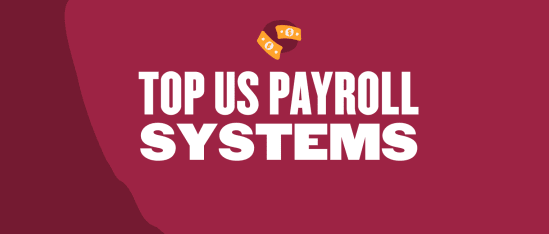Making sure your people get paid on time is critical for businesses. It shows your people you value them, nurtures engagement, and supports business success. But running payroll can be complex and time-consuming, especially when people’s details change and as you add new joiners, remove people who’ve left, and incorporate any salary changes.
In today’s world of multi-site companies, having a payroll system to help automate processes across all your locations is key to saving time, easing pressure, and ensuring compliance with local laws.
Let’s look at the leading payroll companies in the US to support your payroll process and keep your people happy.
Key insights
- Choosing the right payroll company is essential for streamlining payroll processes and ensuring timely, accurate payments for your team
- Leading payroll providers offer automation, compliance management, and integration with HR systems to reduce manual work and minimize errors
- Scalable, cloud-based platforms provide flexibility, automatic updates, and cost-effectiveness modern HR teams need to adapt without disruption
Leading payroll companies and services in the US: Quick overview
We reviewed different payroll software based on how well they automate pay runs, handle tax compliance, and support businesses at different stages of growth. Here’s a quick overview of what each company focuses on:
- HiBob: Leading all-in-one payroll management and HR platform that unites payroll, time, and benefits in one system
- ADP: Payroll and human capital management (HCM) provider with flexible plans that scale from small businesses to enterprises
- CloudPay: Global payroll and payments platform that integrates with ERP and HCM systems
- Dayforce: HCM platform with a real-time payroll engine
- Deel: Global payroll provider with contractor management and Employer of Record (EOR) services
- Gusto: Payroll and HR platform for small to midsize businesses with built-in benefits administration
- Homebase: Scheduling and time-tracking platform with payroll designed for hourly teams
- Justworks: PEO service that bundles payroll with compliance and benefits
- OnPay: Full-service payroll platform with industry-specific support
- Oyster: Global payroll and HR platform with compliance and ERP integrations
- Patriot Software: Small-business payroll and accounting platform with budget-friendly pricing
- Paychex: Payroll and HR suite that scales with growing businesses
- Paycor: Payroll and HR platform with built-in workforce analytics and compliance tools
- Paylocity: Cloud-based payroll and HR system with automated audits and tax compliance
- QuickBooks Payroll: Payroll platform integrated directly with QuickBooks accounting software
- Remote: Global HR and payroll provider for managing distributed teams
- Rippling: Workforce management platform that unifies payroll, HR, IT, and finance
- Square Payroll: Payroll system built for retail, service, and hospitality businesses using Square POS
- SurePayroll: Online payroll service for small businesses and household employers
- TriNet: PEO provider offering payroll, benefits, and compliance management
- Wave Payroll: Payroll software integrated with Wave’s free accounting platform
Choosing the right payroll company for your US business
When selecting a payroll system for your business, start by identifying the services and capabilities your teams need now—and what they may need as your organization evolves. Payroll isn’t just a back-office task. As industry analyst Pete Tiliakos puts it, payroll was once seen as “just printing checks,” but that perception is shifting fast.
Tiliakos predicted that 2025 would mark a “golden age” for payroll, and the signs are already clear. “The convergence of cloud technology, integrations and APIs, and the onset of AI and machine learning have collectively ushered in a new era,” he explains. These innovations are enabling payroll professionals to combine deep expertise with data insights, helping drive efficiency, accuracy, and greater strategic value.
To find the right solution, speak with stakeholders across finance, HR, payroll, and other connected teams. What features are essential? Which integrations will streamline workflows? Do compliance requirements differ across your jurisdictions? As automation and intelligence become core to modern payroll systems, Tiliakos notes that today’s platforms do far more than process pay—they help teams adapt quickly and make smarter, faster decisions.
Scalability is also key. For growing businesses, the ability to expand or adapt without disrupting operations supports long-term resilience. And with payroll and compensation functions becoming increasingly interconnected, a system that bridges both can improve accuracy, responsiveness, and alignment with your broader people strategy.
There’s no universal solution, so create a shortlist based on your company’s size, structure, and goals. Compare options side by side, and weigh the pros and cons relative to your needs. The right payroll system will not only ensure compliance and boost efficiency—it will also give your people more time to focus on what matters most.
Different types of payroll systems
Not every business has the same payroll needs. Understanding the main types of payroll systems can help you choose the one that fits your company’s size and growth plans.
On-premises software
On-premises payroll software is the traditional go-to for large enterprises. These solutions can give you a high level of control over your data management. However, on-premises software also requires your company’s IT department to have the capacity to support its implementation and maintenance—and it can be hard to scale at speed.
If you’re considering on-prem payroll software, be sure to ask the following questions in your decision-making discussions:
- What are the capital and operating expenses tied to maintaining its hardware, deployment, and routine operation?
- Does it have the data protection capabilities your company requires?
- Can it be customized to scale?
- What integrations does it include?
- How often are upgrades needed? Will they require downtime, and can the company afford to wait for the necessary upgrades?
Recommended For Further Reading
Hosted software
Hosted software provides an alternative to on-premises software. It’s housed in a remote data center and operated by a third-party provider.
It’s worth bearing in mind that implementing a hosted software system can be a lengthy process. Additionally, implementing new releases for hosted software systems can be expensive and time-consuming, which may not be ideal if yours is an agile, fast-paced business.
Cloud-based software
Cloud-based payroll software is versatile, enabling modern HR professionals to scale up and scale down their payroll provision with ease, depending on need. Cloud-based payroll software companies typically employ a per-person, per-month subscription model. You simply pay for what you use.
With fast implementation, automatic upgrades, and customization capabilities, cloud-based software is a secure, flexible, and cost-effective way for modern HR professionals to manage their organization’s payroll.
Leading payroll companies and services in the US
In today’s multi-site, global business landscape, a modern payroll system is critical. The right payroll platform automates complex processes, adapts to changing employee details, supports compliance across multiple jurisdictions, and bridges the gap between payroll and compensation.
According to Tiliakos, this shift is being driven by “digital technology, globalization, intensifying compliance requirements, and multigenerational workforce dynamics”—forces that highlight payroll’s central role in both risk management and organizational growth.
Let’s explore a list of the best payroll software that can help ease the pressure. Some of the most popular cloud-based payroll systems in the US include:
HiBob
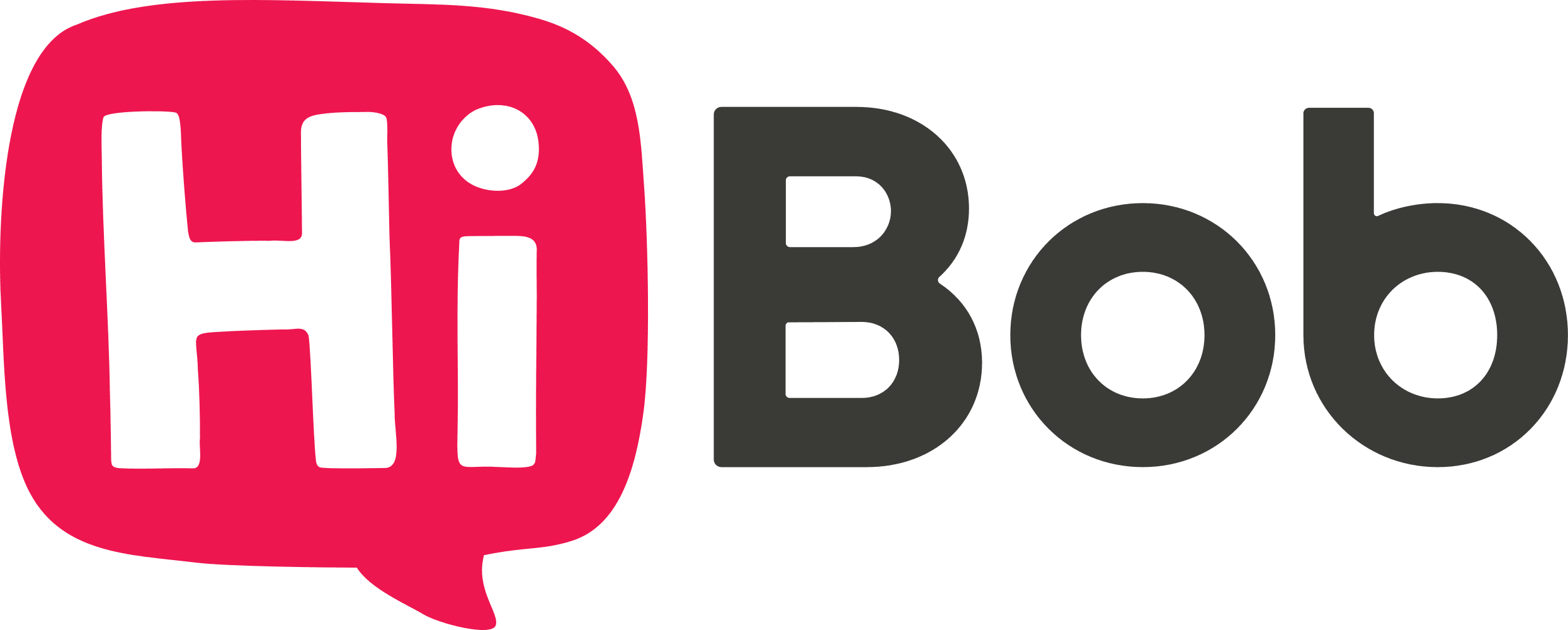
HiBob offers US Payroll as an all-in-one solution built into your HR platform, delivering accurate, compliant, and AI-powered payroll across all 50 states. It connects seamlessly with Core HR functions, including Payroll Hub, time tracking, and employee benefits, so updates like new joiner information, pay changes, and benefit selections flow directly into payroll with no manual work required. Powered by leading payroll processors and HiBob’s embedded AI, every payroll cycle runs smoothly with automated calculations, real-time compliance checks, and proactive error detection, helping teams save time, reduce risk, and stay confident every payday.
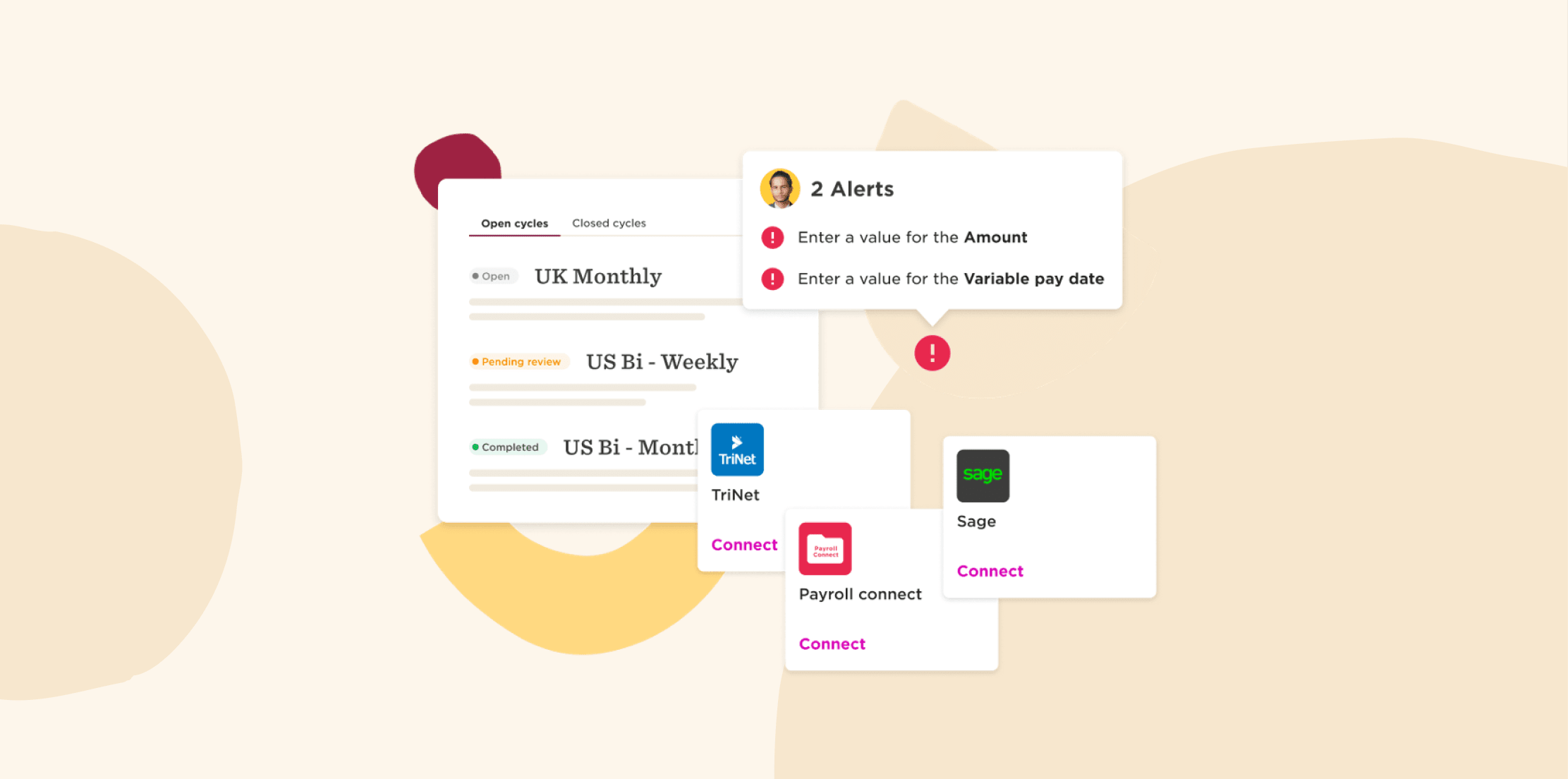
Features:
- All-in-one platform: Accurately sync HR, time, benefits, and payroll data in one system
- Real-time calculations: Receive automatic gross-to-net calculations to minimize reconciliation errors
- Flexible payroll cycles: Run weekly, biweekly, monthly, or off-cycle payrolls for local and multi-site teams
- Compliance: Access built-in tax updates that apply federal and state changes automatically
- Audit-ready reporting: Generate reports that simplify audits and year-end filing.
Pros:
- “Whether I’m updating my profile, checking my pay info, or booking time off, it’s all super easy to find and use.” – user review
- “Integrates easily, using marketplace, with lots of finance, recruitment, timesheet and payroll solutions” – user review
Cons:
- “Some parts of the platform, especially the compensation module, still have a way to go.” – user review
- “Additional cost for ‘add-ons’ such as training, payroll etc modules.” – user review
Pricing: Contact HiBob for a custom plan
Learn more about HiBob payroll
ADP

ADP offers managed online payroll services that flex according to budget, company size, and specific needs. It integrates with business software, time tracking, HR platforms, and ERPs. Its scalable features and support include automated payroll and payroll tax filing, enabling companies to streamline and simplify payroll.
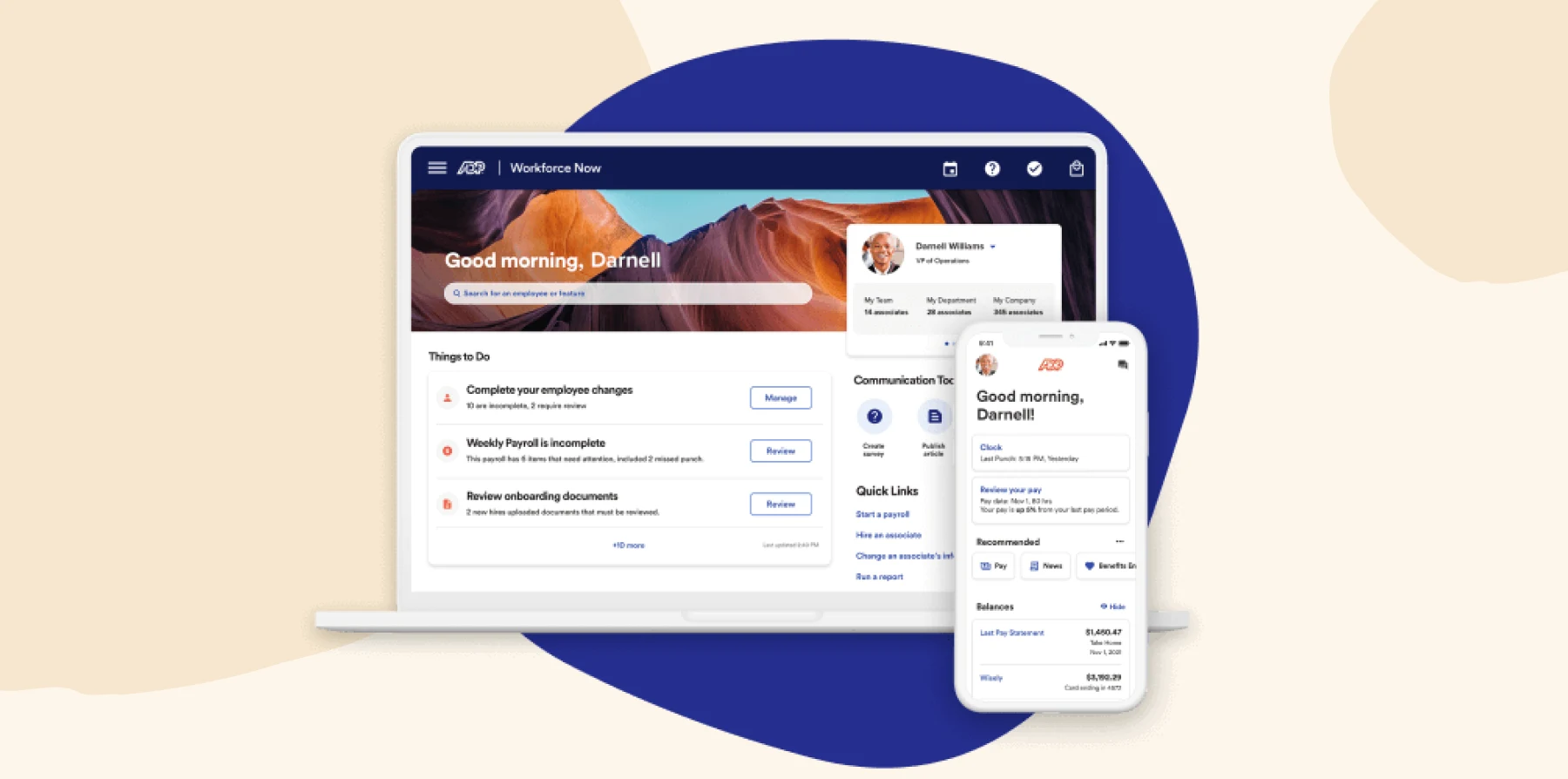
Features:
- Automated calculations: Handle gross-to-net pay, deductions, and withholdings
- Tax filing support: Submit federal, state, and local taxes automatically
- Self-service portal: People can view pay stubs, update bank details, and manage payroll info
- Flexible payment options: Support direct deposit, pay cards, and paper checks
Pros:
- “It has a mobile application that you can download/review your pay slip,” – user review
- “I like that they have a dashboard where you can get an overview of the actions that you need to take.” – user review
Cons:
- “What I dislike most about ADP Payroll Services is their extremely poor technical support.” – user review
- “Faulty Timecard software, always getting wrong pay periods.” – user review
Pricing: Custom pricing
(This article includes platform features and pricing platforms that reflect the information available on the ADP website as of the publication date.)
Cloudpay

CloudPay consolidates payroll operations and treasury services on one cloud platform and can be a match for any company going global. It integrates with leading HCM and ERP software to provide seamless data exchange and a single source of information. CloudPay tracks performance and compliance requirements, standardizes processes, and drives operational improvements.
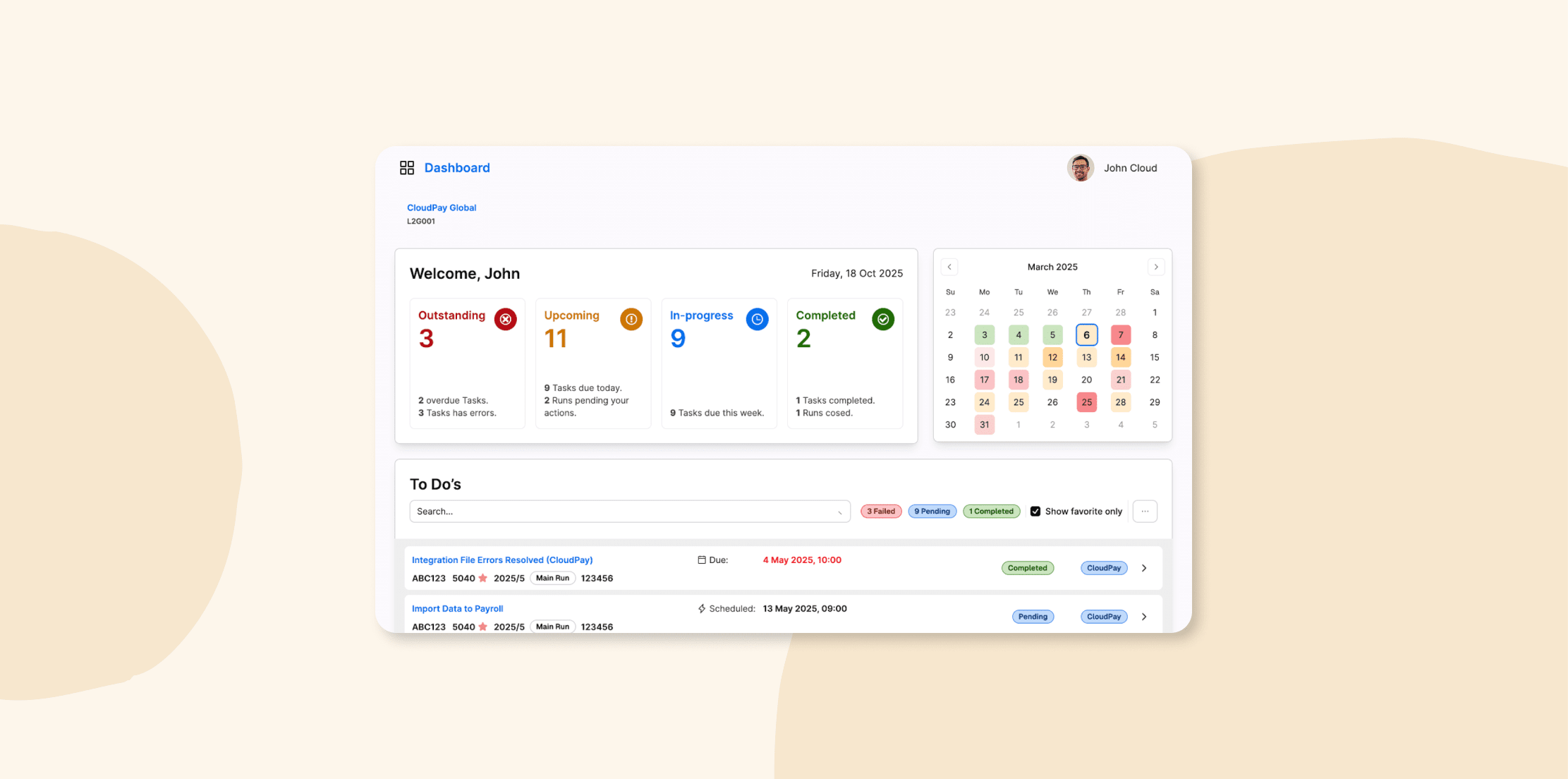
Features:
- Unified payroll: Feed payroll runs directly into treasury workflows.
- Global compliance hub: Automatically apply country-specific tax and labor rules.
- ERP and HCM integration: Connect with platforms like Workday, SAP, Oracle
- Managed service option: Access global experts who can run your payroll operations fully
Pros:
- “I like that it is accessible on any device.” – user review
- “They’re great when answering questions on payroll in different countries.” – user review
Cons:
- “There are other options from the larger companies that have more resources to provide you with lower fees and more available tech support.” – user review
- “There are a few bugs in the system, so enhanced testing and regression should be taken into consideration on a regular basis.” – user review
Pricing: Custom pricing
(This article includes platform features and pricing platforms that reflect the information available on the Cloudpay website as of the publication date.)
Dayforce

Ceridian Dayforce is an HCM platform with payroll functionality. It offers a continuous calculation engine that updates pay data in real time. This allows changes like overtime, benefits, or tax adjustments to reflect instantly.
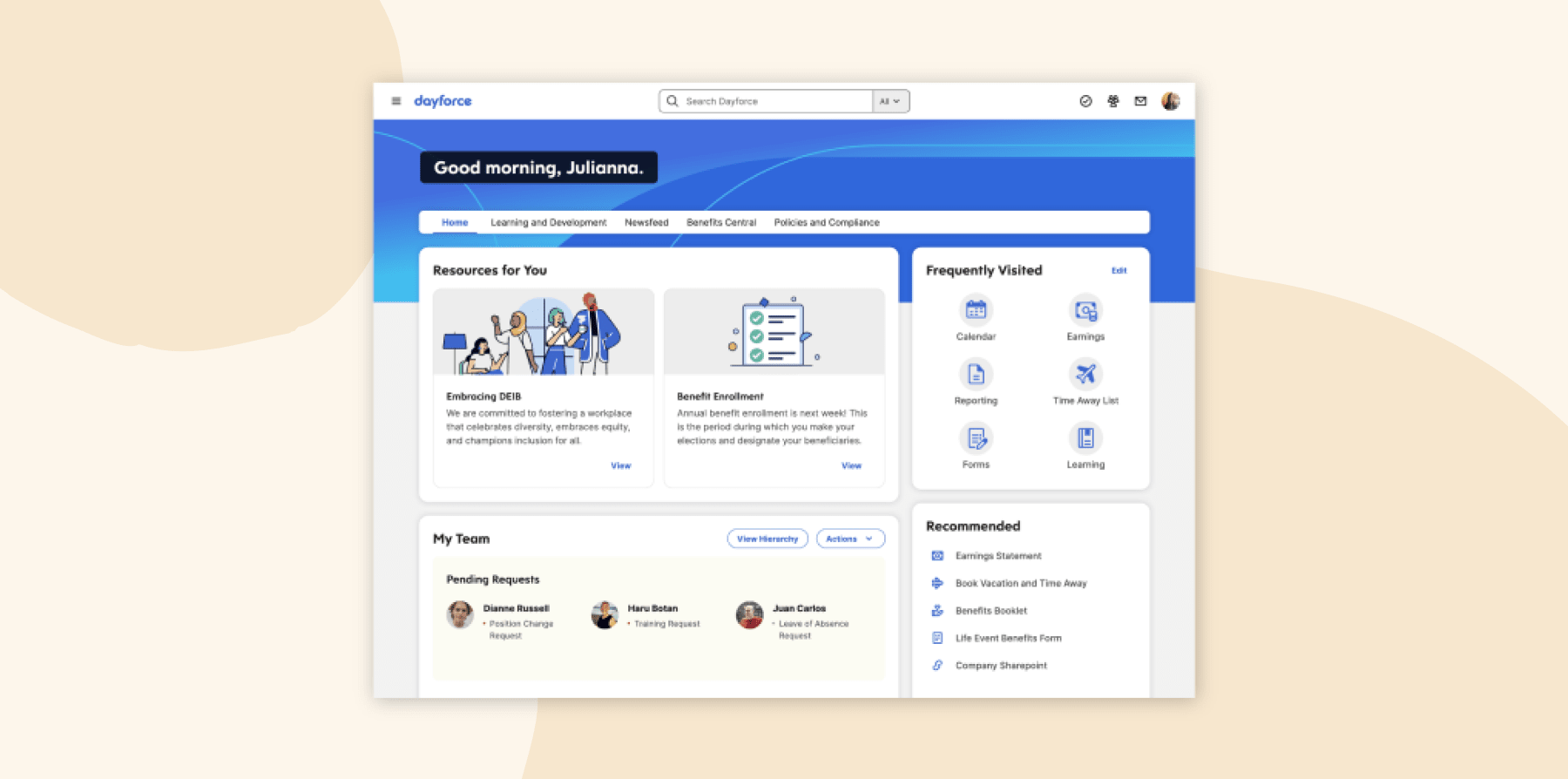
Features:
- Real-time payroll engine: Constantly update payroll to prevent errors
- All-in-one HCM: Access HR, payroll, benefits, and compliance in a single interface
- Workforce management sync: Feed scheduling and hours directly into pay calculations
- Analytics: View dashboards and reports to inform decisions with up-to-date data
Pros:
- “It is simple to use when it comes to keeping record of shift timings.” – user review
- “Great system to have everyone in different countries on the same platform.” – user review
Cons:
- “I dislike the system responsiveness and speed as there could be slow load times, especially during peak payroll for example.” – user review
- “The reporting in Dayforce is the worst I have seen in any single system.” – user review
Pricing: Custom pricing
(This article includes platform features and pricing platforms that reflect the information available on the Dayforce website as of the publication date.)
Deel

Deel is a payroll solution that applies a simple case-by-case tier pricing system to its global payroll based on country and number of users per location. Deel is one of the first payroll platforms to feature unified contractor payments, employer-of-record services, and payroll management. It helps companies scale without needing a local payroll team in every state.
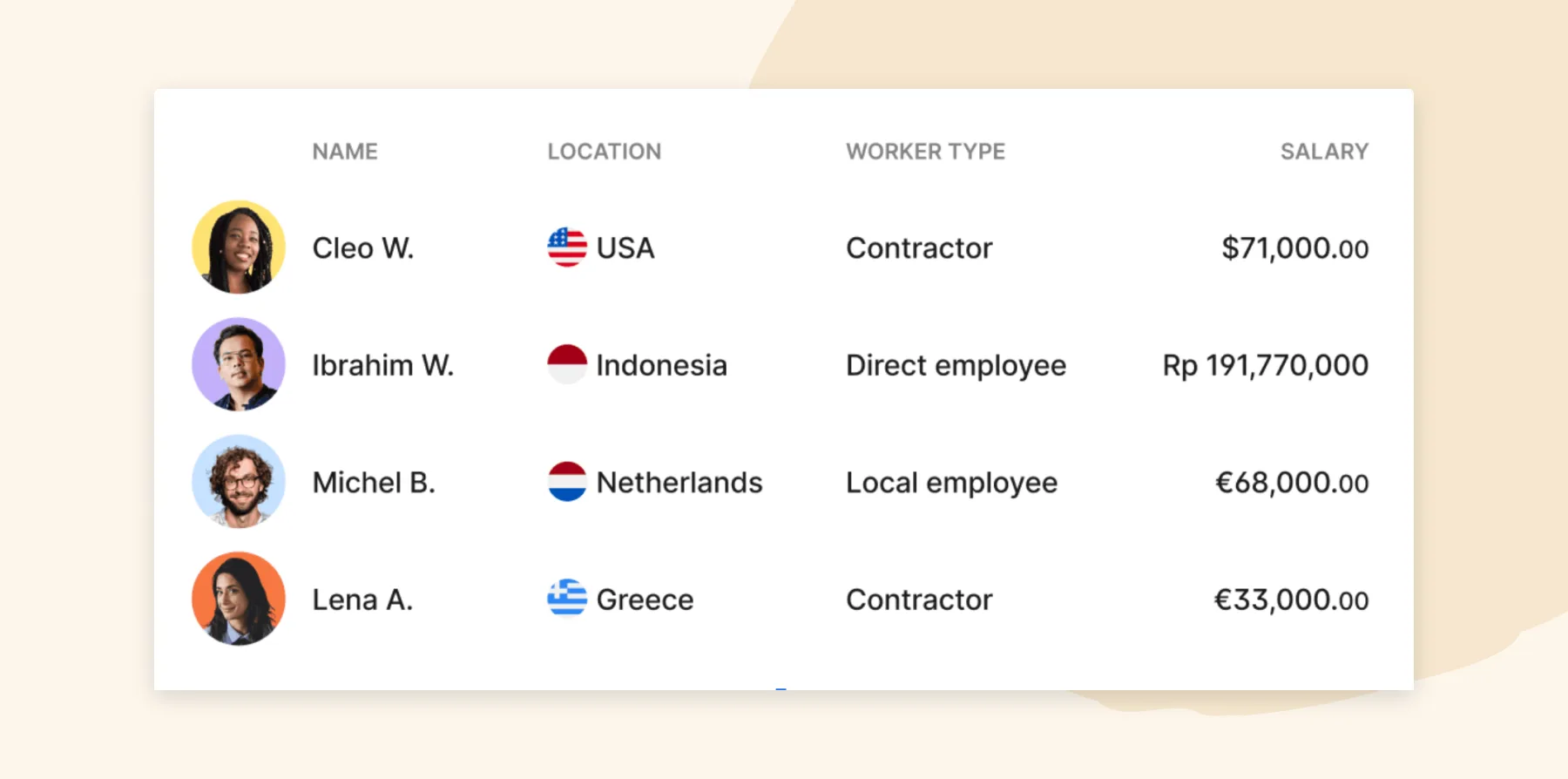
Features:
- Global payroll: Automate payroll across 150+ countries with local compliance built in
- Multi-currency support: Pay team members and contractors in their local currencies
- Contractor management: Onboard, pay, and manage contractors with legally compliant contracts
- EOR services: Hire team members abroad without setting up local entities.
Pros:
- “The platform supports multiple currencies and payment methods, making payroll straightforward no matter where you’re located.” – user review
- “Deel simplifies the whole payroll process.” – user review
Cons:
- “The initial customer support response time was slower than expected, and some payroll terms (like proration) weren’t clearly explained at first, which created a bit of confusion for our team.” – user review
- “Deel is very expensive.” – user review
Pricing:
- Deel US Payroll: Custom pricing
- Deel Global Payroll: $29/mo
(This article includes platform features and pricing platforms that reflect the information available on the Deel website as of the publication date.)
Gusto

Gusto is a payroll and HR platform tailored for small to mid-sized businesses. It combines payroll processing with benefits administration and compliance to run payroll across all 50 states. Gusto emphasizes automation with unlimited pay runs, tax filings, and integrations with HR tools from a single dashboard.
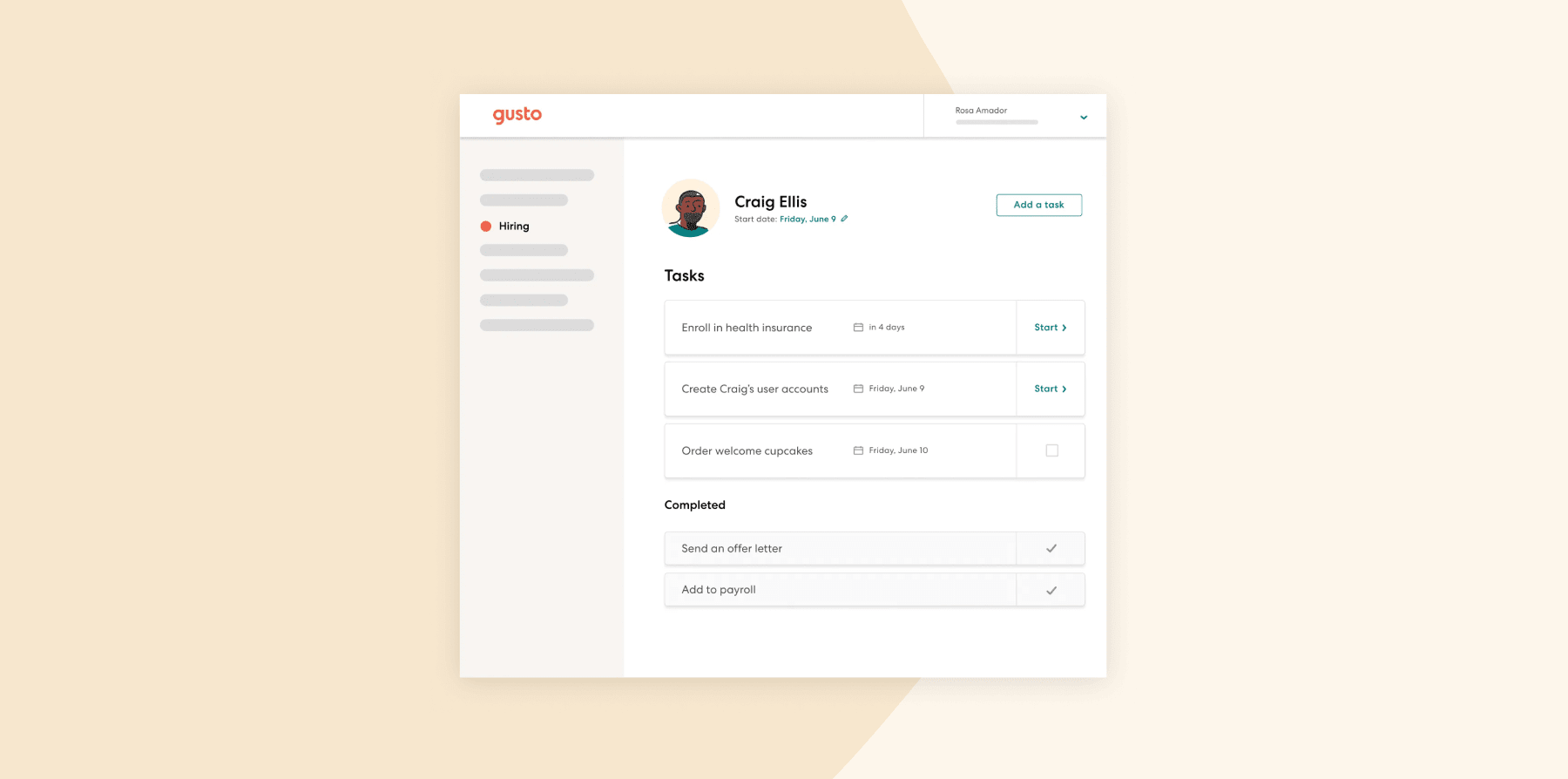
Features:
- Full-service payroll: Calculate wages, file federal and state taxes, and deliver payments automatically
- Unlimited runs: Process as many payroll cycles as needed, including off-cycle and bonus payments
- Benefits integration: Sync health insurance, retirement plans, and other benefits directly with payroll
- Time tracking: Connect hours, PTO, and workers’ comp to pay runs
Pros:
- “I can complete tasks like running payroll or updating employee info in just a few clicks.” – user review
- “They take care of the filing and local tax payments.” – user review
Cons:
- “For startups like ours working with public grants and youth intern programs like MBSYEP, it could offer more tailored features.” – user review
- “The customer service is less than stellar- it often feels like you’re shouting into the wind.” – user review
Pricing:
- Simple: Starts at $49/mo
- Plus: Starts at $80/mo
- Premium: Starts at $180/mo
- Contractor Only: Starts at $35/mo
(This article includes platform features and pricing platforms that reflect the information available on the Gusto website as of the publication date.)
<< See how HiBob compares to Gusto. >>
Homebase

Homebase is a scheduling and time-tracking platform with payroll as an add-on. It targets small businesses with hourly workers. Homebase addresses workforce management for restaurants, retail, and service industries by linking timesheets, schedules, and payroll in one system.
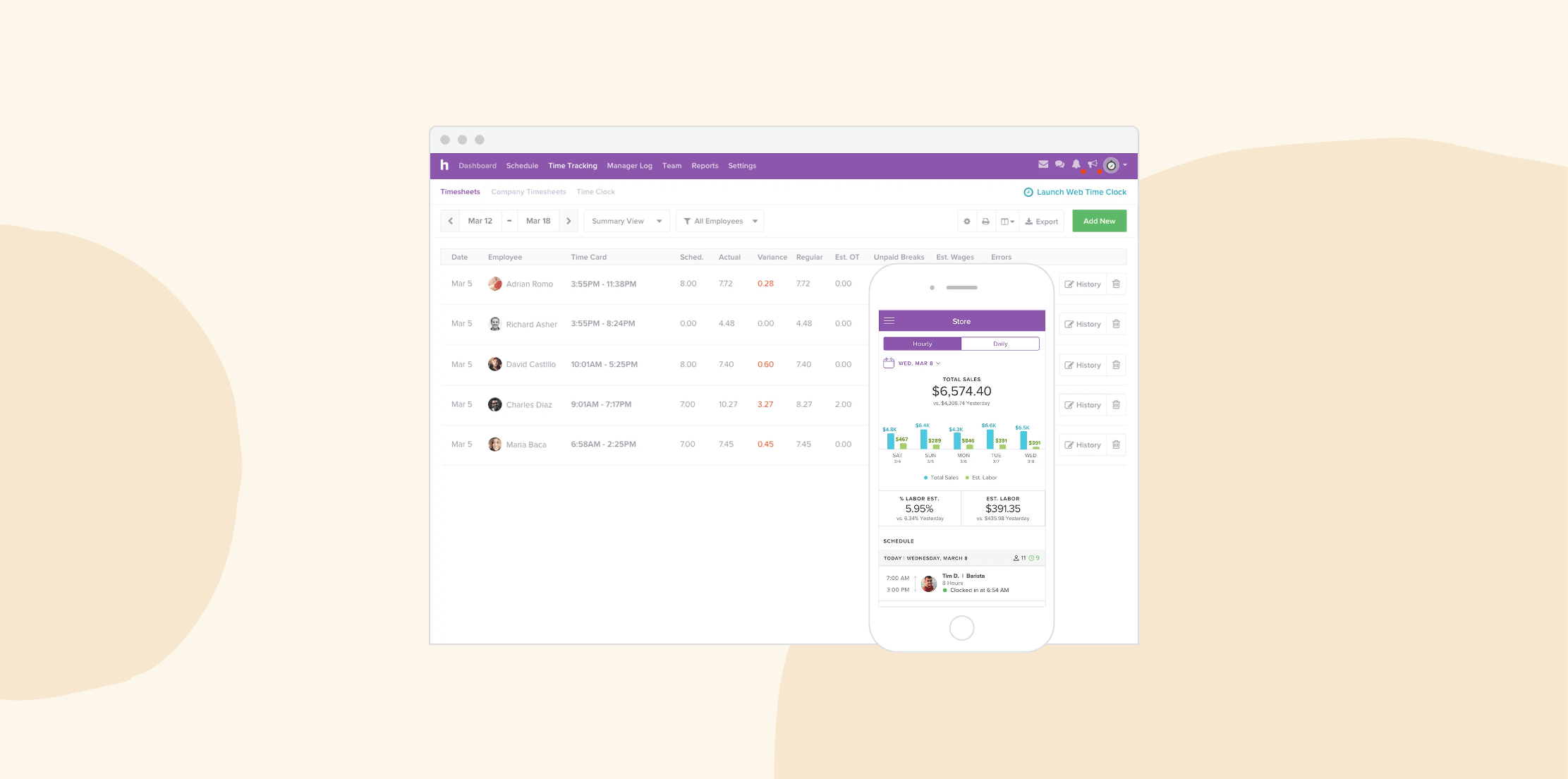
Features:
- Integrated timesheets: Convert tracked hours into payroll-ready data
- Automated payroll: Handle wage calculations, direct deposits, and tax filings automatically
- Scheduling tools: Build and share work schedules with shift reminders and coverage alerts
- Mobile time clock: Let people clock in/out from any device, with overtime tracking included
Pros:
- “Our staff loves being able to check their schedules, swap shifts, and clock in/out straight from their phones.” – user review
- “Real-time labor cost projections and reports help managers stay within budget and avoid overtime.” – user review
Cons:
- “We do get some pushback about difficulty using it from the staff side.” – user review
- “The platform often runs very slowly and takes too long to load or process tasks, which really affects our workflow.” – user review
Pricing:
- Basic: Starts at $39/mo
- Essentials: Starts at $69/mo
- Plus: Starts at $109/mo
- All-in-one: Starts at $159/mo
(This article includes platform features and pricing that reflect the information available on the Homebase website as of the publication date.)
Justworks

Justworks is a PEO platform that bundles payroll with HR, benefits, and compliance services. It can act as the legal employer and handle taxes, filings, and benefits. This lets companies access enterprise-grade support and payroll functionality with minimal setup.
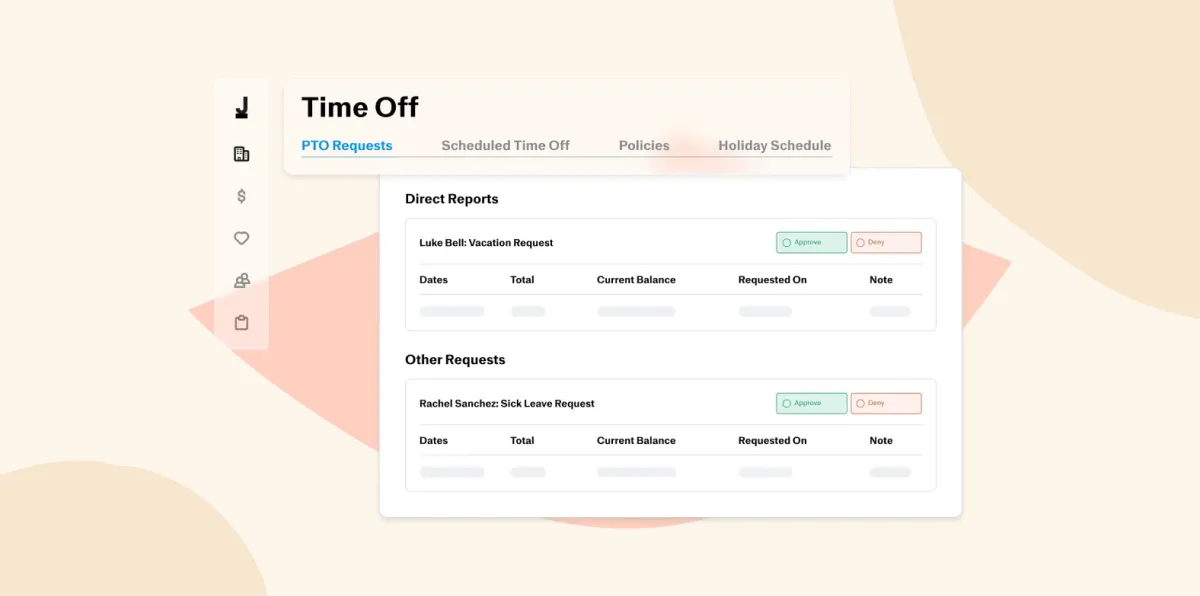
Features:
- Full-service payroll: Automate wage calculations, deductions, and tax filings
- PEO model: Use as an employer of record to manage benefits and compliance
- Benefits access: Offer health insurance, 401(k), and commuter benefits
- Time tracking integration: Syncs hours worked directly into payroll runs
Pros:
- “Payroll, benefits, taxes, employee onboarding, compliance – everything is under control.” – user review
- “Justworks has significantly simplified our payroll process.” – user review
Cons:
- “It’s very stressful working around holidays.” – user review
- “JustWorks’ service model is such that your representatives are service/sales people, not experts in payroll, tax, benefits or compliance.” – user review
Pricing: $8/mo per user
(This article includes platform features and pricing that reflect the information available on the Justworks website as of the publication date.)
OnPay

OnPay is a cloud-based payroll provider tailored for small businesses. It offers unlimited pay runs, comprehensive tax filing, and specialized support for industries like restaurants, farms, and nonprofits. OnPay works across all 50 states.
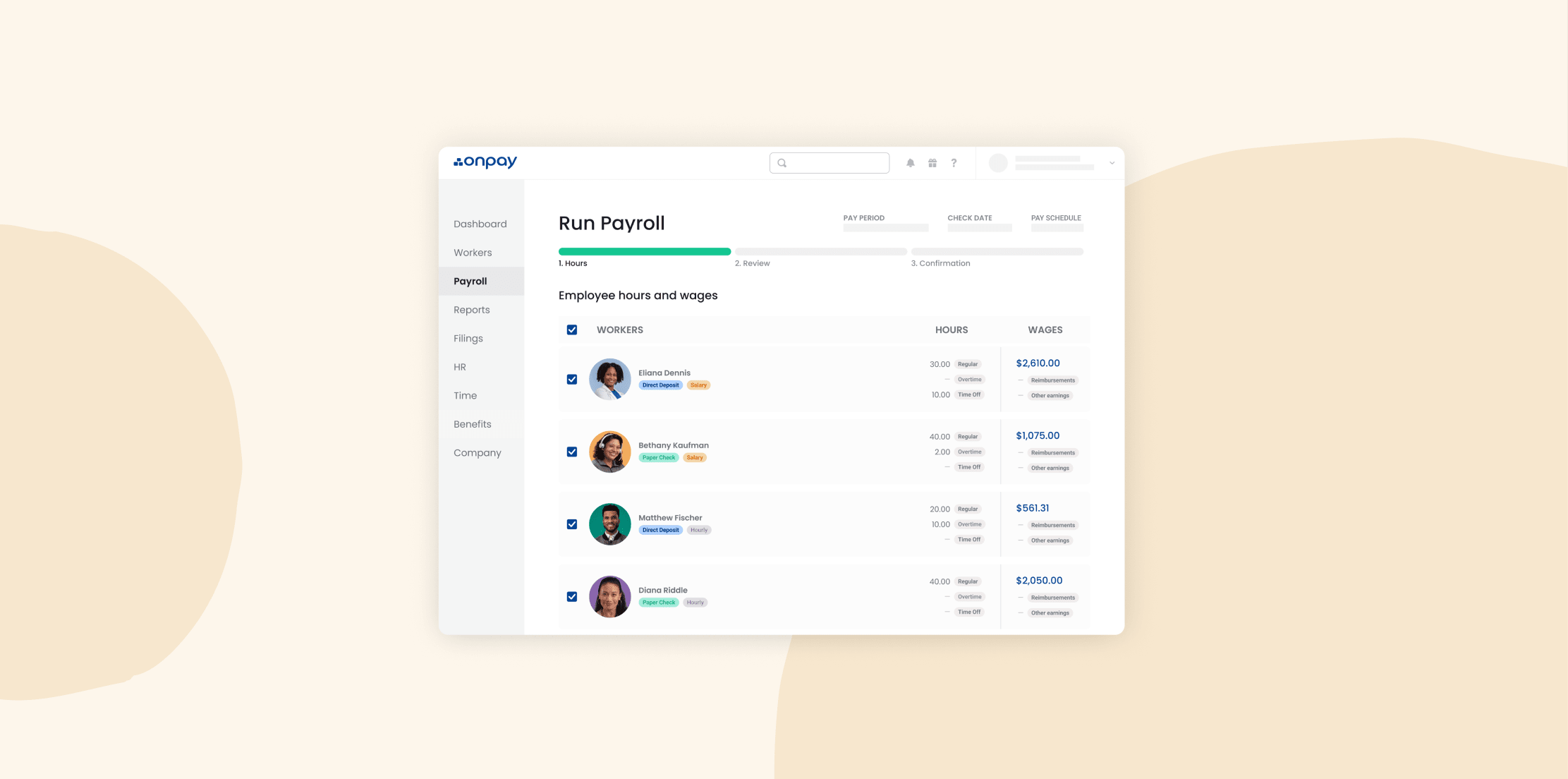
Features:
- Unlimited payroll: Run payroll as often as needed, at no extra cost
- Tax filing service: Calculate, file, and pay federal, state, and local payroll taxes
- Benefits integration: Connect with health insurance and retirement plans
- HR add-ons: Access tools for onboarding, PTO tracking, and compliance documents
Pros:
- “The OnPay user experience is logical and descriptive which lead to less of my time onboarding & submitting.” – user review
- “OnPay had state-specific tax guides that helped guide us through the state registration process.” – user review
Cons:
- “OnPay’s opening the account for running payroll is not a quick process.” – user review
- “I have had a couple of hiccups during the payroll run.” – user review
Pricing: $40/mo, plus $6 per user
(This article includes platform features and pricing that reflect the information available on the OnPay website as of the publication date.)
Oyster

Oyster’s payroll platform syncs with multiple ERP systems and HRIS software. The platform manages payroll, generates reports, and delivers compliant international payments. Oyster’s built-in features support a range of ad-hoc payments—from expense reimbursements to performance bonuses.
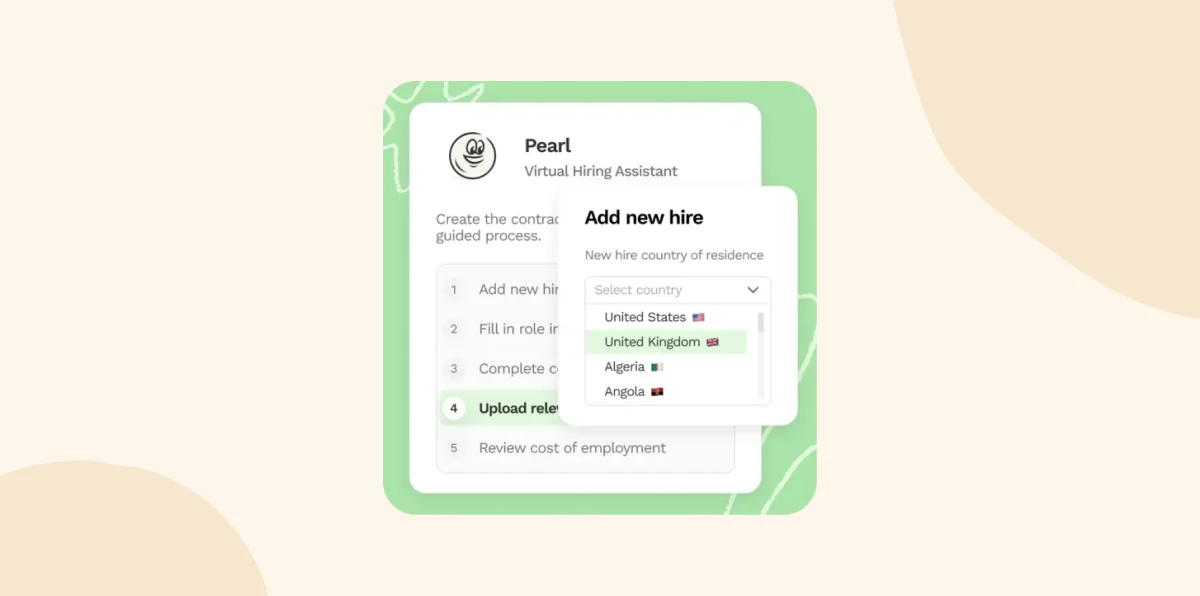
Features:
- Global payroll: Run payroll across many countries
- Automated workflows: Automatically calculate pay, withhold taxes, generate payslips, and sync data
- HRIS and expense integrations: Connect with your existing HR, ERP, and expense tools
- Payroll specialists on call: Contact local experts to guide you through regional compliance
Pros:
- “The dashboard showed the current status of everything and details.” – user review
- “Having everything from documents to reimbursements in one place really streamlines operations for both the employee and the company.” – user review
Cons:
- “Payouts can lag a day when bank rails/holidays get in the way” – user review
- “Responses from the payroll team can take longer than expected.” – user review
Pricing:
- Contractor: $29/mo per contractor
- Global Payroll: $25/mo per user
- Employer of Record: $699/mo
- Scale: Custom pricing
(This article includes platform features and pricing that reflect the information available on the Oyster website as of the publication date.)
Patriot Software

Patriot is a payroll and accounting platform mainly for small businesses. It offers simple payroll processing with customizable pay frequencies and integrates directly with Patriot’s accounting software or QuickBooks. The platform supports up to 500 people per cycle.

Features:
- Tax filing options: Choose basic self-service or full-service payroll with automatic tax filing
- Flexible pay options: Pay people by direct deposit or print checks
- Portal: Staff can access pay stubs, W-2s, and personal details online
- Accounting integration: Sync payroll data with Patriot Accounting or QuickBooks
Pros:
- “I have been really impressed by how easy it is to navigate the invoicing and payment sections of Patriot Software.” – user review
- “Running payroll is very simple in the software.” – user review
Cons:
- “Sometimes it’s a struggle because for the most part it is not intuitive, not even to write a check.” – user review
- “There is very little integrations in the software.” – user review
Pricing:
- Basic Payroll: Starts at $17/month
- Full-Service Payroll: Starts at $37/month
(This article includes platform features and pricing that reflect the information available on the Patriot website as of the publication date.)
Paychex

Paychex is a payroll and HR services provider that serves businesses of all sizes. Its Paychex Flex system combines payroll, HR, benefits, and compliance tools in one platform. Teams can choose to start with payroll-only features and add HR or analytics as they grow.
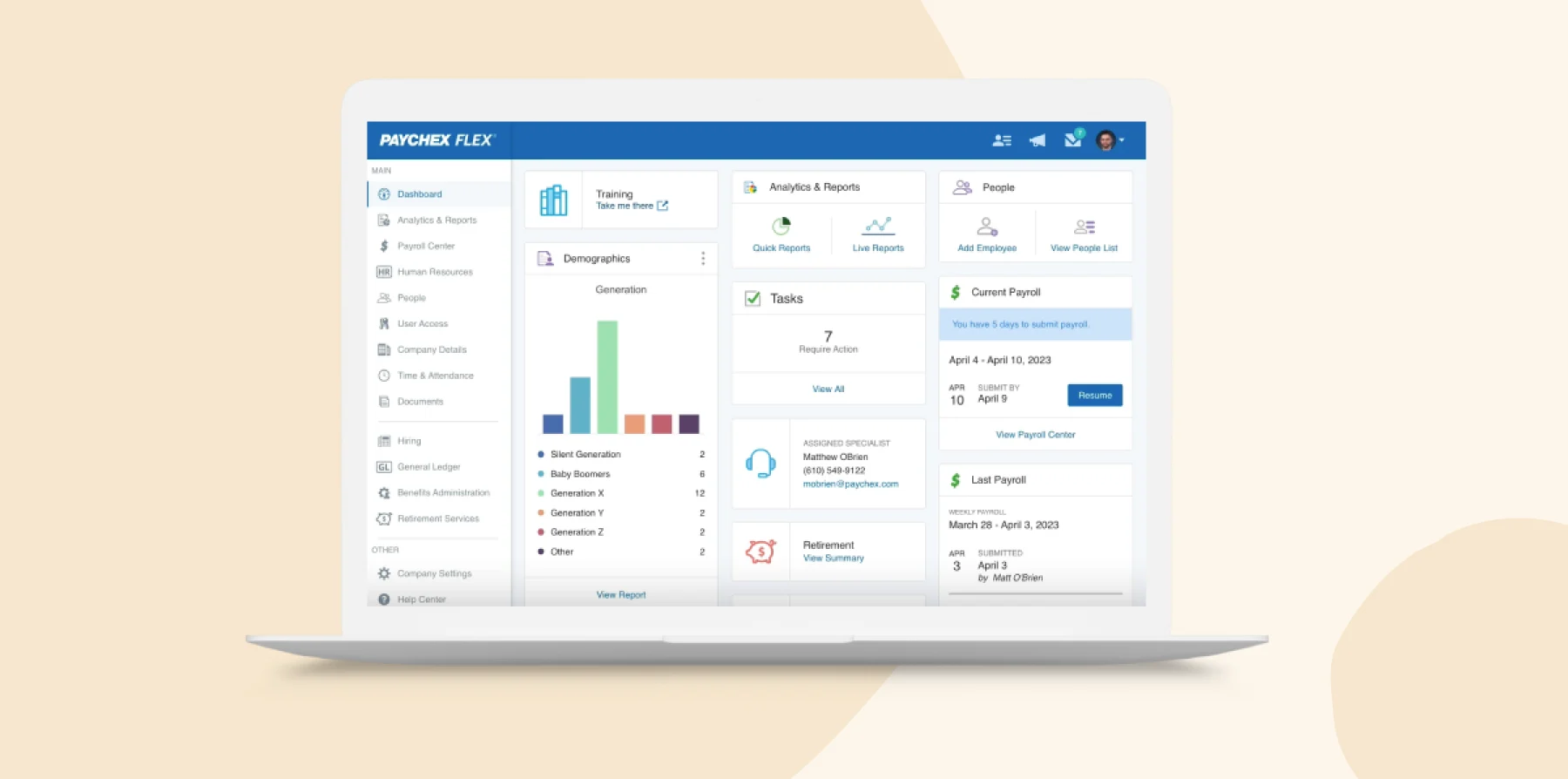
Features:
- Automated payroll: Run payroll online or via mobile with built-in tax filing
- Tax services: Automatically file and pay federal, state, and local taxes with Paychex Taxpay
- Self-service: Team members can view pay stubs, tax forms, and update personal info
- Reporting: Generate payroll journals, job costing, and cash requirement reports
Pros:
- “They manage our tax filings and reporting.” – user review
- “Paychex provides a user-friendly website for payroll entry.” – user review
Cons:
- “They could not handle our payroll, our payroll is not that complicated.” – user review
- “Sometimes the interface is a bit clunky and I’ve had a few instances where their system times out or just doesn’t work efficiently.” – user review
Pricing: Custom pricing
(This article includes platform features and pricing that reflect the information available on the Paychex website as of the publication date.)
Paycor

Paycor offers a hybrid HR and payroll platform. It offers focus in healthcare, hospitality, and retail. Paycor can automate payroll runs, provide earned wage access, and integrate HR and workforce analytics into one system.
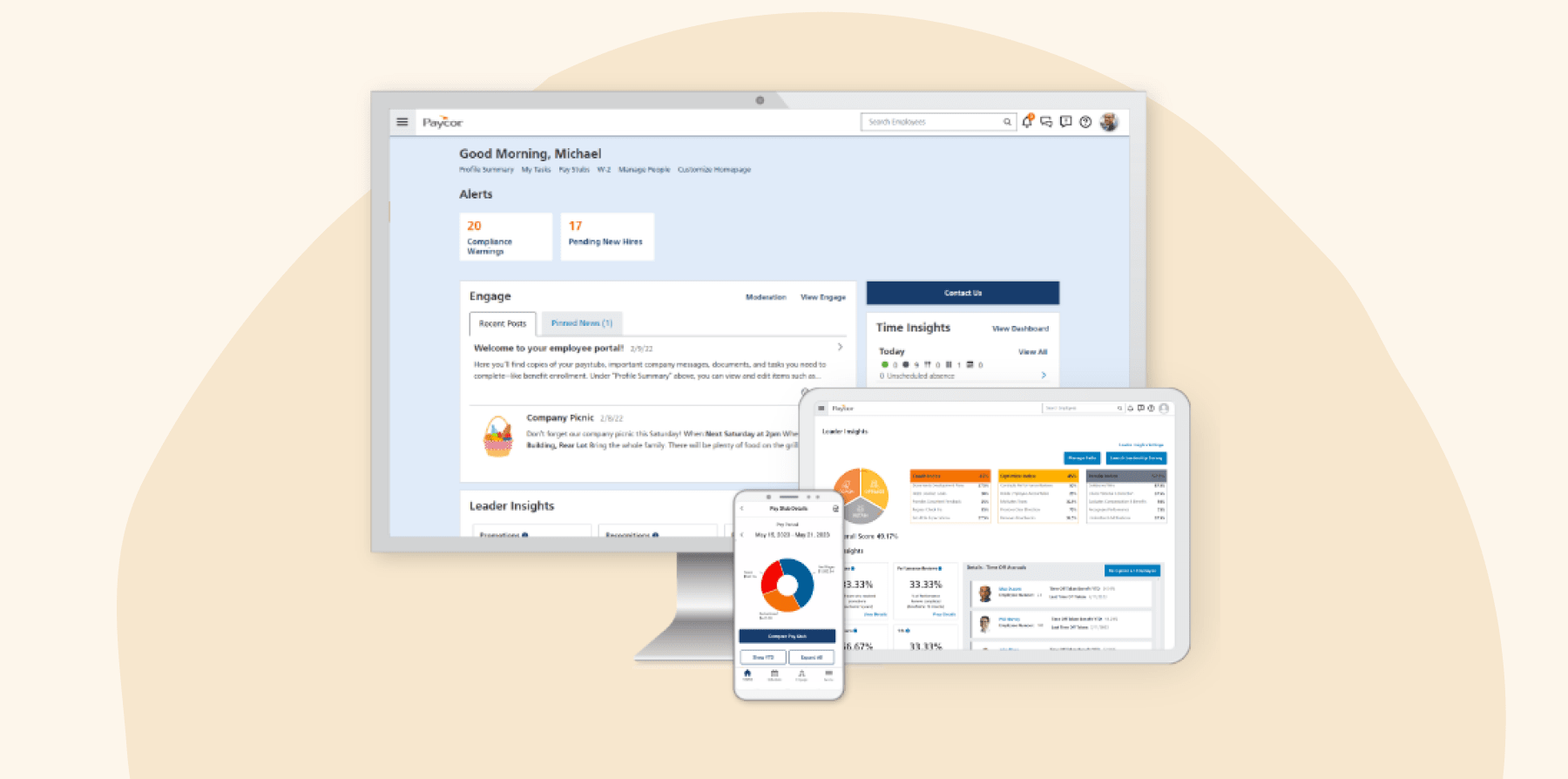
Features:
- Flexible payroll scheduling: Set payroll to run automatically on chosen dates
- Real-time calculations: Ensure accurate pay runs with instant updates
- Tax compliance: Automate filings and alert your team to potential compliance issues
- Analytics: Use predictive analytics for workforce trends, turnover, and compensation
Pros:
- “Whether I was handling payroll tasks, viewing employee information, or managing time-off requests, the interface felt intuitive and efficient.” – user review
- “We use Paycor as an all-in-one HR and payroll solution that streamlines a wide range of administrative functions.” – user review
Cons:
- “Some of the more detailed functions—like reporting or customization—felt limited or less intuitive.” – user review
- “Their system didn’t fit our needs and now it is taking us longer to process our payroll entries.” – user review
Pricing: Custom pricing
(This article includes platform features and pricing that reflect the information available on the Paycor website as of the publication date.)
Paylocity

Paylocity’s cloud-based payroll software simplifies payroll, automates processes, and ensures tax compliance. The platform integrates with HCM software and HR and business systems. It features expense management, tax services, on-demand payment, and garnishment-managed services.
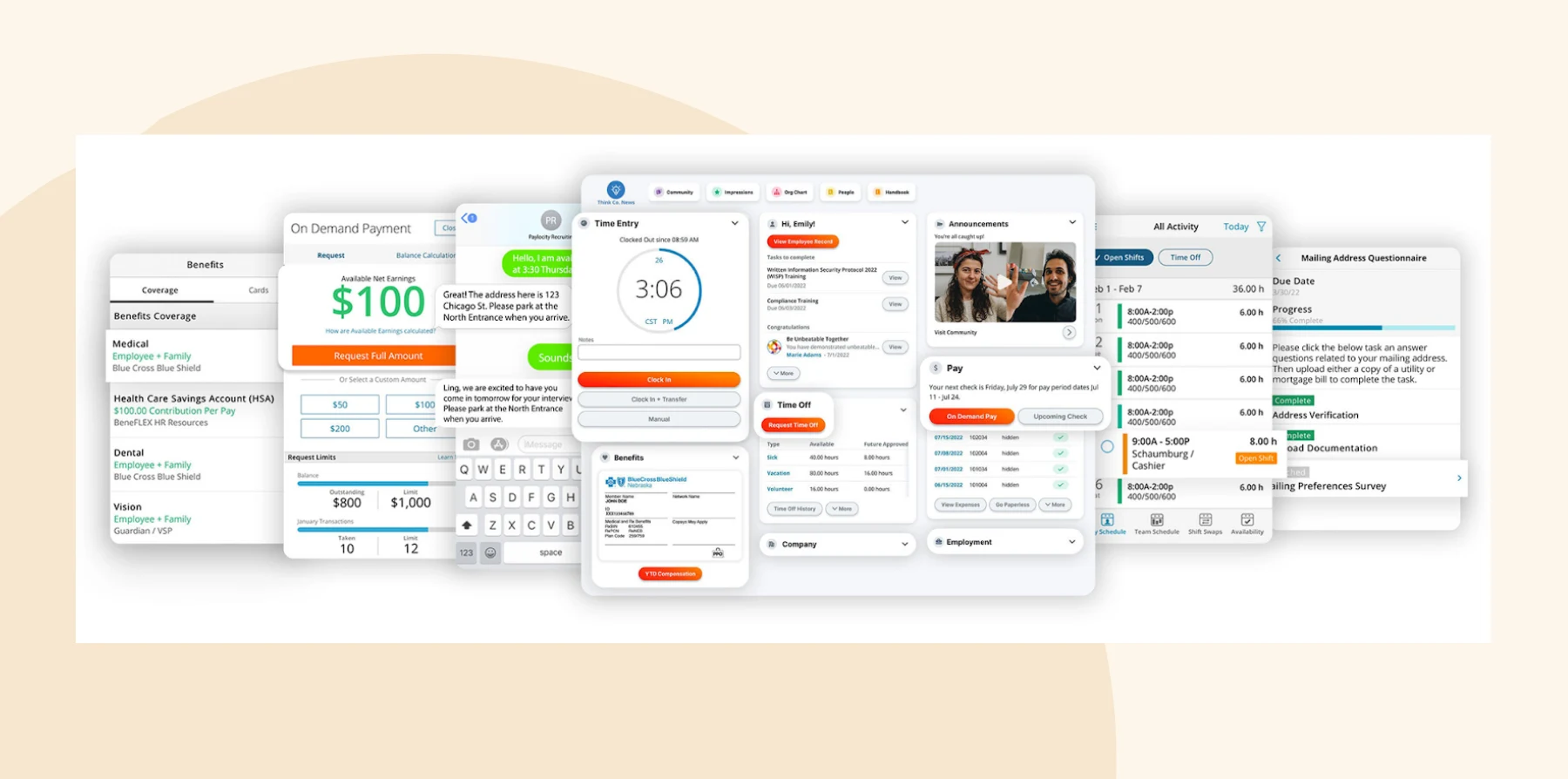
Features:
- Built-in audits: Flags potential errors in hours, deductions, or rates before processing
- Automated calculations: Handle gross-to-net pay with automatic adjustments
- Integrated time tracking: Sync attendance and labor allocations directly into payroll
- Tax compliance: Keep federal, state, and local filings current with automatic updates
Pros:
- “They have great reporting capabilities and I appreciate their data insights to quickly see trends in headcount, spending, turnover, and more.” – user review
- “Paylocity has been able to grow with us.” – user review
Cons:
- “The product implementations felt rushed to the point that my team felt that important information was missed.” – user review
- “More complex technical issues and tax-related support requests can take longer to resolve.” – user review
Pricing: Paylocity offers custom pricing for each of its HR, finance, and IT modules.
(This article includes platform features and pricing that reflect the information available on the Paylocity website as of the publication date.)
Quickbooks

QuickBooks Payroll is Intuit’s payroll solution that links directly to QuickBooks accounting. It’s designed for businesses that want payroll and accounting in one ecosystem. They offer same-day direct deposit and built-in tax penalty protection on higher-tier plans.
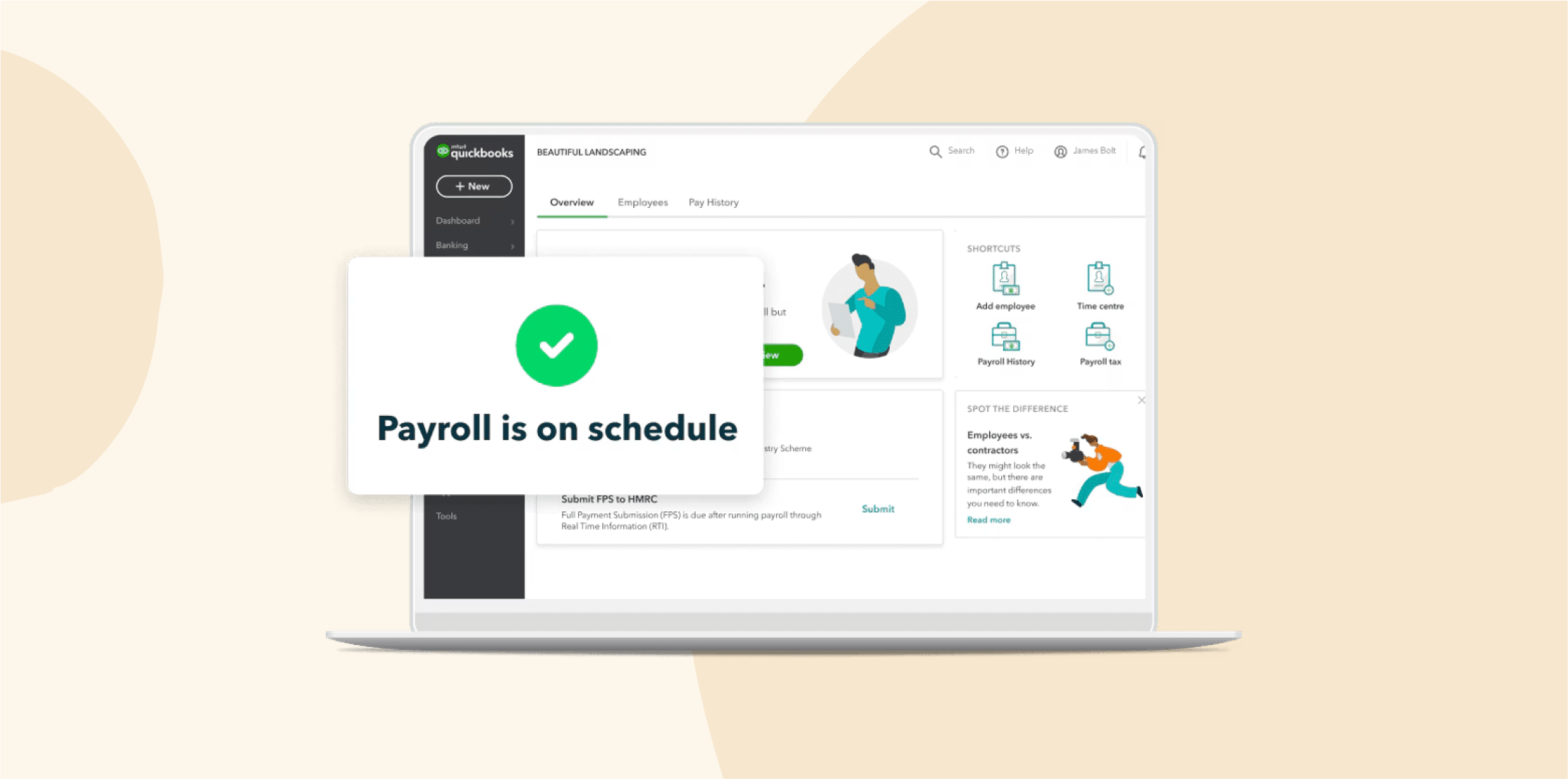
Features:
- Auto Payroll: Set recurring pay cycles to run automatically with review options
- Direct deposit options: Offer next-day deposits or same-day, depending on plan
- Penalty protection: Cover IRS payroll tax penalties, regardless of fault
- HR: Access tools for compliance, onboarding, and document management
Pros:
- “It was easy to install, and we used it bi-weekly.” – user review
- “We like that it is easy to start accounting journal entries for any new entities which are considered to have separate balance sheets.” – user review
Cons:
- “Having some employees who were on salary and some hourly made it more difficult to add in the taxes for each. And we had to file our own taxes.” – user review
- “No notice on tax payment withdrawal.” – user review
Pricing:
- Payroll Core: Starts at $50/mo
- Payroll Premium: Starts at $88/mo
- Payroll Elite: Starts at $134/mo
(This article includes platform features and pricing that reflect the information available on the QuickBooks website as of the publication date.)
Remote

Remote’s central platform houses global payroll, benefits, and documents. It integrates with other popular HR tools. Remote also includes pension collections, payslips, bonuses and other incentives, tax deductions, and tax returns.
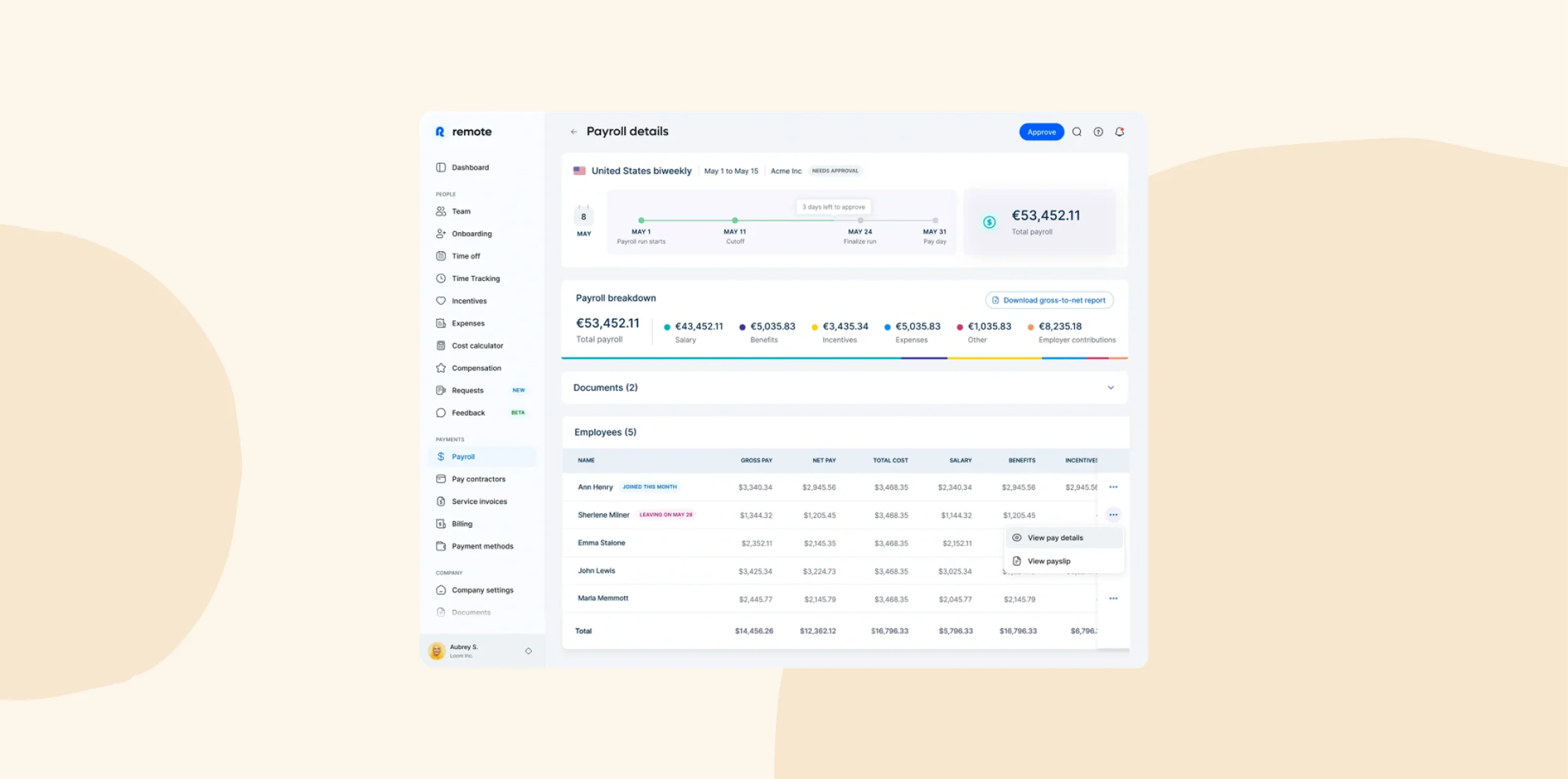
Features:
- Global payroll: Run payroll across 100+ countries
- Contractor management: Onboard and pay contractors with built-in contract templates
- Multi-currency support: Pay everyone in their local currency
- Centralized HR: Manage employee lifecycle, benefits, and equity alongside payroll.
Pros:
- “Remote.com has been a great solution for managing international payroll, benefits, and compliance for distributed teams.” – user review
- “Payroll is more accurate and processed faster.” – user review
Cons:
- “Limited third-party integrations.” – user review
- “There’s a learning curve when getting started, especially if you’re new to international employment.” – user review
Pricing: Starts at $29/mo
(This article includes platform features and pricing that reflect the information available on the Remote website as of the publication date.)
Rippling

Rippling is a workforce management platform that unifies payroll with HR, IT, and finance in one system. Payroll runs with an error-free guarantee and all people data like hours, benefits, and reimbursements syncs automatically. Rippling also provides workflow automation tools with over 500 third-party integrations.
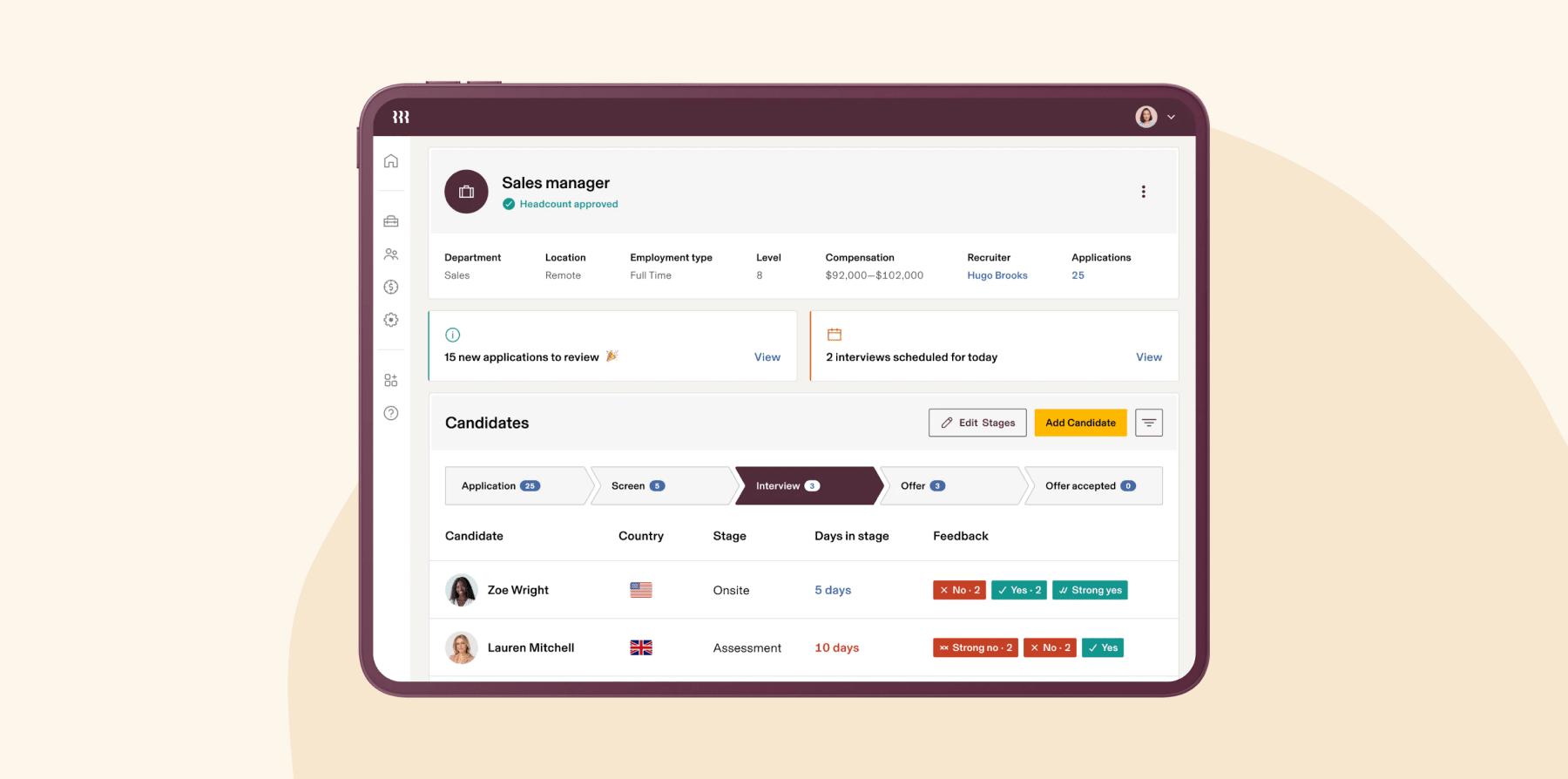
Features:
- Automated payroll: Calculate wages and file taxes at the federal, state, and local level.
- Unlimited off-cycle runs: Incur no extra fees for bonuses or corrections
- Data syncing: Hours, benefits, expenses, and PTO update payroll in real time.
- Custom pay types: Access support for project rates, stipends, and specialized pay rules
Pros:
- “From onboarding and payroll to benefits administration and device management, everything is integrated seamlessly.” – user review
- “When you hire someone, you basically click a button and they’re set up with payroll” – user review
Cons:
- “We ran into frequent sync issues with payroll.” – user review
- “The initial learning curve can be steep, especially when setting up custom workflows and understanding all the available features.” – user review
Pricing: Custom pricing
(This article includes platform features and pricing that reflect the information available on the Rippling website as of the publication date.)
<< See how HiBob compares to Rippling. >>
Square Payroll

Square Payroll is mainly built for retail, service, and hospitality businesses already using Square’s point-of-sale system. It simplifies payroll for hourly teams by syncing directly with timecards and offering flexible payment options. Square’s focus is on making payroll connected to its payment system.
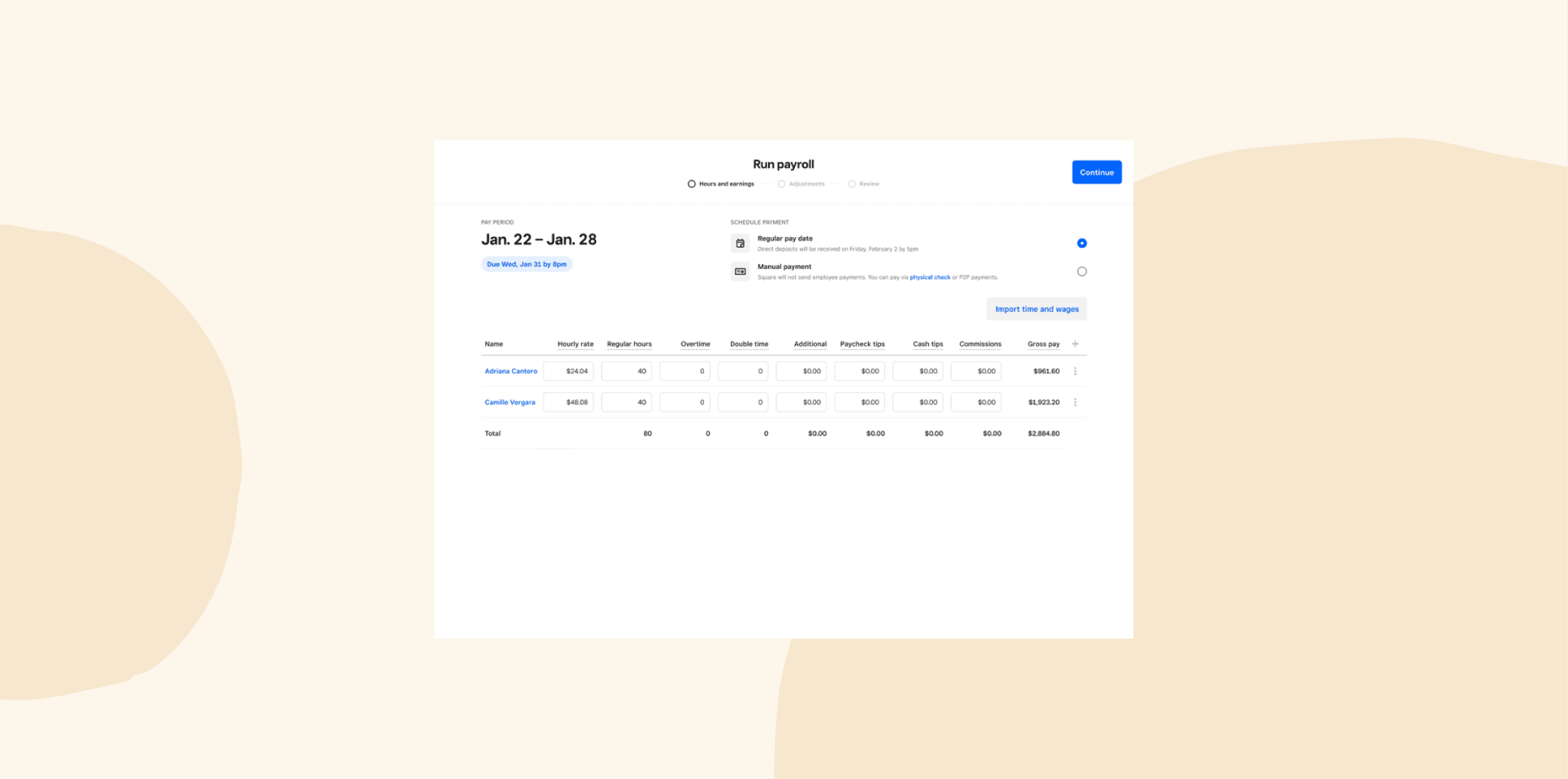
Features:
- POS integration: Sync timecards and tips directly from Square’s POS system
- Automated tax filing: File and pay federal, state, and local payroll taxes
- Flexible pay: Pay staff by direct deposit, paper check, or Cash App
- Team access: Let people view pay stubs and tax forms in the Square Team App
Pros:
- “I like the ease once I first setup my payroll for my business.” – user review
- “Square makes it incredibly simple to convert worked timecards into easy payroll processing for wages.” – user review
Cons:
- “Sometimes, there are issues of overpayment of taxes on Square’s side.” – user review
- “There is a bit of difficulty if you run into a problem with banking info using direct deposit.” – user review
Pricing: Starts at $35/mo
(This article includes platform features and pricing that reflect the information available on the Square website as of the publication date.)
SurePayroll

SurePayroll is another online payroll platform by Paychex. It gears itself toward small businesses and household employers. It handles the essential tasks of payroll like direct deposit setup, tax calculations, and reporting.
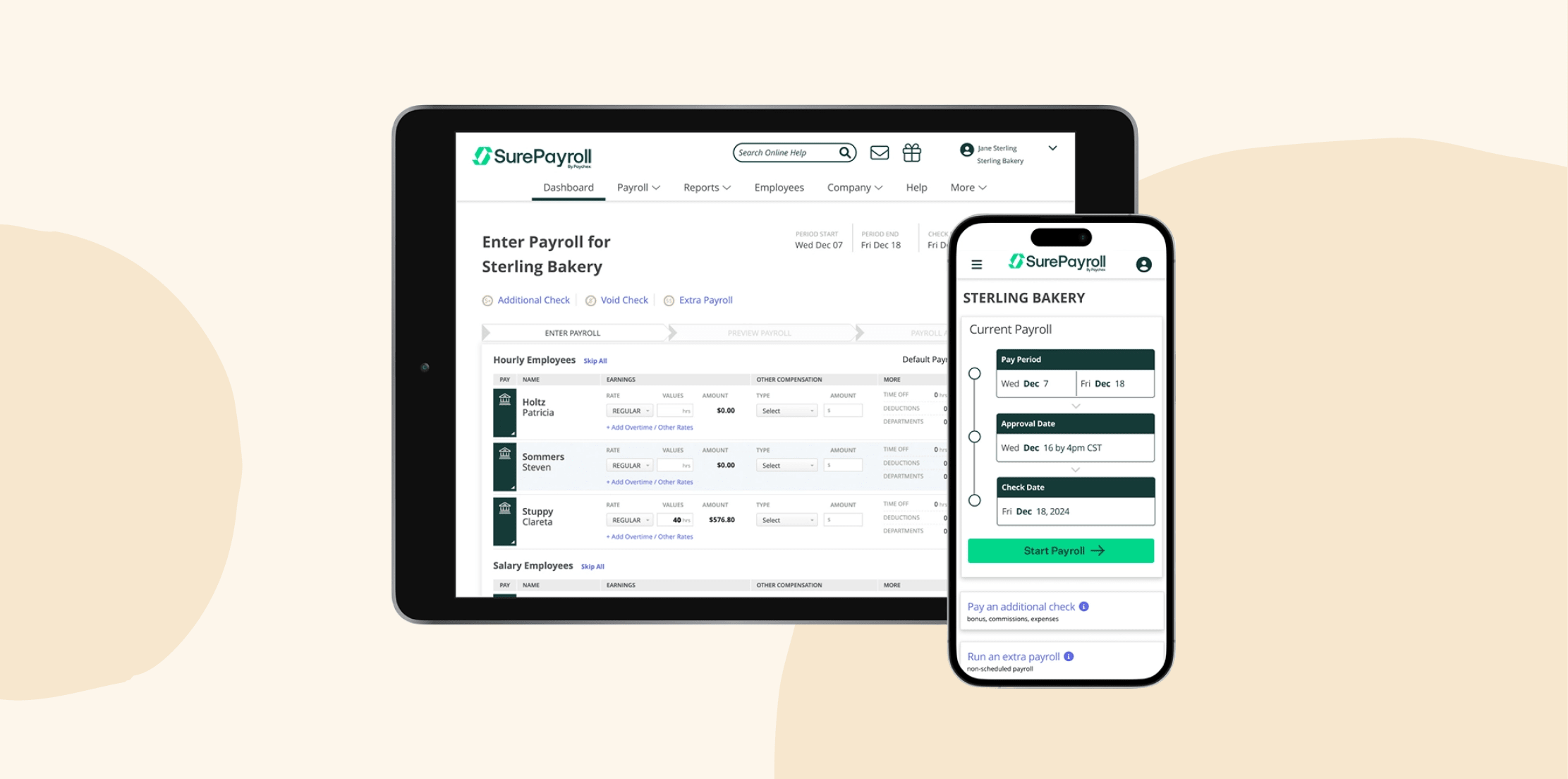
Features:
- Unlimited payroll: Run payroll whenever needed with 2-day direct deposit
- Online access anytime: View pay stubs, W-2s, and basic reports from any device, 24/7
- Supported setup: Access free onboarding support to help you get started
- Flexible worker types: Support both W-2 team members and 1099 contractors within the same system
Pros:
- “If I had to pick something, it’s the competitive pricing.” – user review
- “I suppose it seems like their government filings are accurate.” – user review
Cons:
- “When doing an off-cycle payroll, it was a little confusing to make a paper check vs use direct deposit.” – user review
- “The amount you’ll pay them and fines and fees to the IRS and your accountant, it’s just not worth it.” – user review
Pricing:
- No Tax Filing: Starts at $20/mo
- Full Service: Starts at $29/mo
(This article includes platform features and pricing that reflect the information available on the SurePayroll website as of the publication date.)
TriNet

TriNet’s cloud-based payroll platform helps small and mid-size businesses manage payroll and navigate evolving tax codes. The platform integrates with accounting systems and HRIS software and can manage payroll throughout the team member lifecycle. It features self-service tools, resources, and systems that flex as a company grows.

Features:
- Comprehensive payroll: Run payroll with automated tax filing and direct deposits
- PEO model: Access HR, compliance, and risk management alongside payroll
- Benefits administration: Gives people access to health, retirement, and insurance plans
- Compliance: Apply federal, state, and local tax updates automatically
Pros:
- “I find TriNet to be an incredibly easy-to-use payroll and HR service.” – user review
- “TriNet does a great job with payroll, health benefits, and reporting.” – user review
Cons:
- “Their time tracking platform and payroll platforms are separated.” – user review
- “There are also moments when navigating between benefits, payroll, and company documents feels clunky or inconsistent.” – user review
Pricing: Custom pricing
(This article includes platform features and pricing platforms that reflect the information available on the TriNet website as of the publication date.)
Wave Payroll

Wave Payroll is part of Wave’s financial software suite. Users can incorporate it with their existing Wave software accounting or invoicing. It provides simple integrations and a budget option for businesses that need payroll connected to bookkeeping.
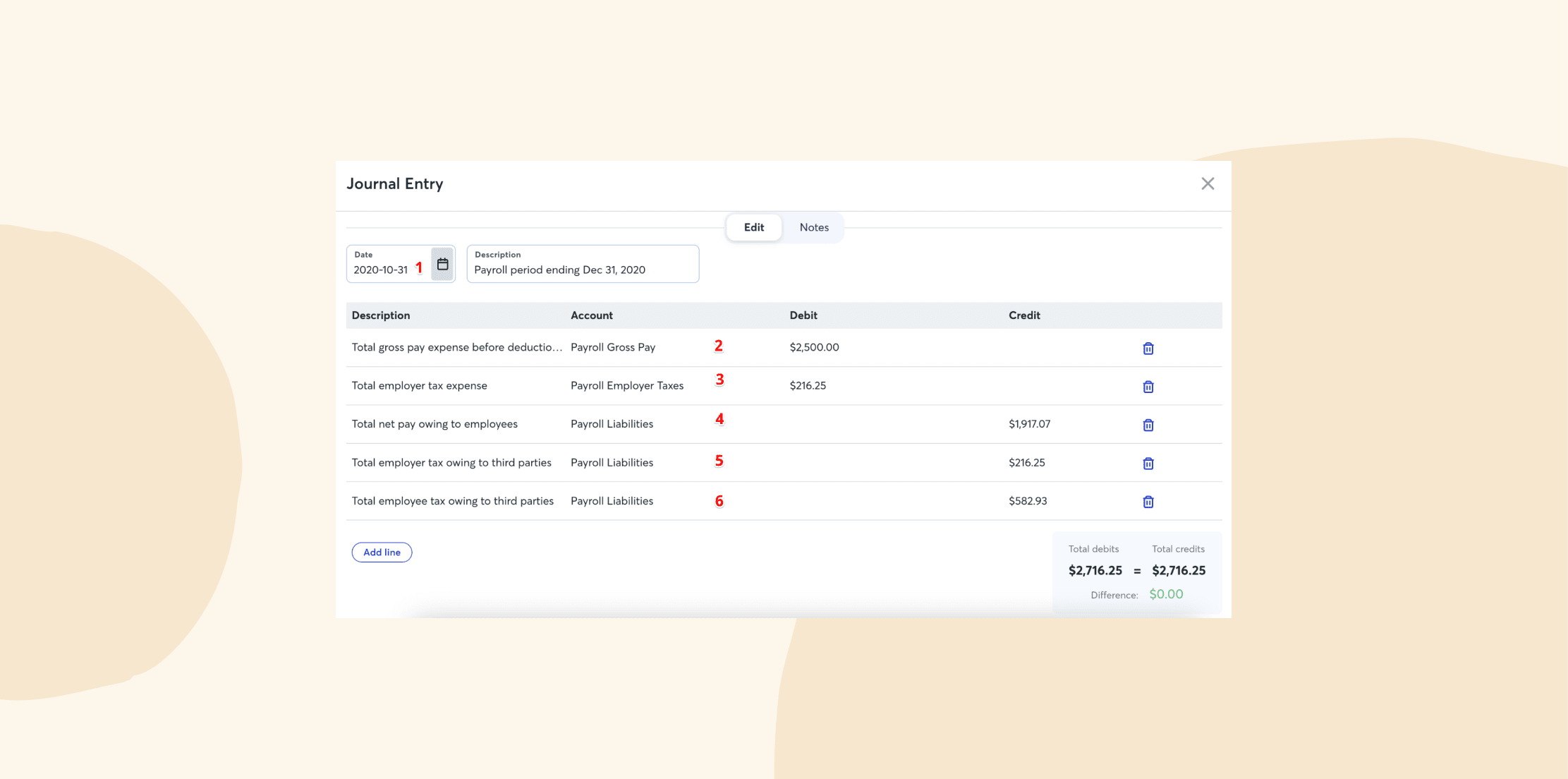
Features:
- Payroll integration with accounting: Automatically sync payroll entries with Wave’s accounting tools
- Direct deposit: Pay people directly to their bank accounts
- Tax form generation: Produce W-2s and 1099s for all users
- Self-service: Staff can access pay stubs, tax forms, and update bank/contact information
Pros:
- “The flexibility to run payroll is what I liked about Waves.” – user review
- “The feature that I like the most is the automation and third-party integrations it offers.” – user review
Cons:
- “Need to pay overtime? Not well supported. Need to resolve an issue? Be prepared to wait a week or more to hear back.” – user review
- “The software interface is overly simplistic and doesn’t support very basic payroll use cases.” – user review
Pricing:
- Starter: $0
- Pro: $19/mo
(This article includes platform features and pricing platforms that reflect the information available on the Wave website as of the publication date.)
Choose the leading payroll company for your US business
The right payroll provider can take a major burden off your team by automating pay runs, filing taxes accurately, and ensuring your people are paid on time. It helps businesses of all sizes reduce compliance risks, cut down on manual errors, and give team members a smoother experience with self-service access to their pay details.
For companies that want payroll, HR, time, and benefits all in one system, consider HiBob. With Payroll Hub, everything lives on a single, intuitive platform—no middleware, no duplicate data entry. Leaders get automated gross-to-net calculations, flexible payroll cycles, and real-time compliance updates, while your people enjoy clear, reliable access to their information.
The result is payroll that’s beautifully simple and designed to support compliance.
Learn what HiBob can do for your payroll
TL;DR – HiBob leads the list of all-in-one payroll software in the US with flexible cycles, compliance management, and ease of use.
FAQs on top payroll companies
What is payroll software?
Payroll software is a digital system that helps businesses calculate wages, withhold taxes, and pay team members on time. It can automate routine tasks like creating payslips, handling deductions, and filing reports with tax agencies. Businesses prefer payroll software over manual valuations because it saves time, reduces errors, and ensures compliance with local laws.
How does payroll software work?
Payroll software pulls in team member data like hours worked, salaries, and tax details. It automatically applies deductions, benefits, and tax rules, then generates accurate paychecks or direct deposits. Many platforms also file payroll taxes on your behalf and give people access to self-service portals for their payslips.
How much does payroll software cost?
A business can expect to pay anywhere between a few dollars per person or contractor to $100 per user each month for its payroll services. Most payroll vendors charge a base monthly fee from $20 to $180, plus per-person fees. Costs vary depending on features like tax filing, integrations, and global payroll support.
How do you choose the best payroll software?
In general, the best way to choose payroll software is to make sure it fits your company’s size, needs, and growth plans. Here are a few steps to guide the process:
- Define your needs: Consider the number of users, pay cycles, locations, and compliance requirements you need to manage
- Compare features: Look for automation, integrations with your HR/finance tools, and self-service portals
- Review pricing and scalability: Make sure the plan works for your current budget and can grow with your company
- Bring in key stakeholders: Share information with finance, HR, and operations teams to confirm the software works for everyone
- Get demos and trials: Test-drive platforms before committing so you can see how intuitive they are and whether they save your team time
How do you start doing payroll for small businesses?
If you’re running a small business, the easiest path is to let a payroll platform handle the heavy lifting. These systems automate calculations, generate paychecks, and file taxes, taking tedious admin work off your plate. Instead of worrying about manual calculations and risking costly errors, you can focus on growing your business while your people still get paid correctly and on time.
